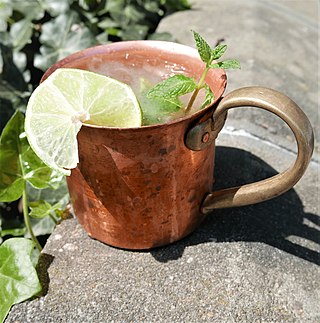
Mojito is a traditional Cuban punch. The cocktail often consists of five ingredients: white rum, sugar, lime juice, soda water, and mint. Its combination of sweetness, citrus, and herbaceous mint flavors is intended to complement the rum, and has made the mojito a popular summer drink.

The French Quarter, also known as the Vieux Carré, is the oldest neighborhood in the city of New Orleans. After New Orleans was founded in 1718 by Jean-Baptiste Le Moyne de Bienville, the city developed around the Vieux Carré, a central square. The district is more commonly called the French Quarter today, or simply "The Quarter", related to changes in the city with American immigration after the 1803 Louisiana Purchase. Most of the extant historic buildings were constructed either in the late 18th century, during the city's period of Spanish rule, or were built during the first half of the 19th century, after U.S. purchase and statehood.

A Moscow mule is a cocktail made with vodka, ginger beer and lime juice, garnished with a slice or wedge of lime, and a sprig of mint. The drink, being a type of buck, is sometimes called vodka buck. It is popularly served in a copper mug, which takes on the cold temperature of the liquid.

The Sazerac is a local variation of a cognac or whiskey cocktail originally from New Orleans, named for the Sazerac de Forge et Fils brand of cognac brandy that served as its original main ingredient. The drink is most traditionally a combination of cognac or rye whiskey, absinthe, Peychaud's Bitters, and sugar, although bourbon whiskey is sometimes substituted for the rye and Herbsaint is sometimes substituted for the absinthe. Some claim it is the oldest known American cocktail, with origins in antebellum New Orleans, although drink historian David Wondrich is among those who dispute this, and American instances of published usage of the word cocktail to describe a mixture of spirits, bitters, and sugar can be traced to the dawn of the 19th century.

The holiday of Mardi Gras is celebrated in southern Louisiana, including the city of New Orleans. Celebrations are concentrated for about two weeks before and through Shrove Tuesday, the day before Ash Wednesday. Mardi Gras is French for Fat Tuesday, the season is known as Carnival and begins on 12th Night, January 6th, and extends until midnight before Ash Wednesday. Club, or Krewe, balls start soon after, though most are extremely private, with their Kings and Queens coming from wealthy old families and their courts consisting of the season's debutantes. Most of the high society Krewes do not stage parades. As Fat Tuesday gets nearer, the parades start in earnest. Usually there is one major parade each day ; many days have several large parades. The largest and most elaborate parades take place the last five days of the Mardi Gras season. In the final week, many events occur throughout New Orleans and surrounding communities, including parades and balls.

Bourbon Street is a historic street in the heart of the French Quarter of New Orleans. Extending twelve blocks from Canal Street to Esplanade Avenue, Bourbon Street is famous for its many bars and strip clubs.

Pat O'Brien's Bar is a bar located in New Orleans, Louisiana that began operation as a legal liquor establishment on December 3, 1933, at the intersection of Royal and St. Peter streets in the French Quarter. Before that, during Prohibition the bar was known as Mr. O'Brien's Club Tipperary; the password "storm's brewin'" was required to gain entrance to the establishment. In December 1942 it moved to its present location at 718 St. Peter Street, into a historic building dating from 1791. Pat O'Brien's is home to the original flaming fountain and the hurricane cocktail. There is also a piano bar, featuring twin "dueling" pianos where local entertainers take song requests. The dueling piano bar is thought to be the first of its kind.

Southern Comfort is an American, naturally fruit-flavored, whiskey liqueur with fruit and spice accents. The brand was created by bartender Martin Wilkes Heron in New Orleans in 1874, using whiskey as the base spirit. Whiskey was replaced by a neutral spirit under the ownership of Brown–Forman. On March 1, 2016, the Sazerac Company purchased it, and reintroduced whiskey as its base spirit.

The Hurricane cocktail is a sweet alcoholic drink made with rum, lemon juice, and either passion fruit syrup or fassionola. It is one of many popular drinks served in New Orleans. It is traditionally served in the tall, curvy hurricane glass.

The Supreme Court of Louisiana is the highest court and court of last resort in the U.S. state of Louisiana. The modern Supreme Court, composed of seven justices, meets in the French Quarter of New Orleans.

A Grasshopper is a sweet, mint-flavored, after-dinner drink named for its green color, which comes from crème de menthe. Tujague's, a bar in the French Quarter of New Orleans, Louisiana, claims its owner Philip Guichet invented the drink in 1918. The drink gained popularity during the 1950s and 1960s throughout the American South.

A "fizz" is a mixed drink variation on the older sours family of cocktail. Its defining features are an acidic juice and carbonated water. It typically includes gin or rum as its alcoholic ingredient.

Arnaud's is a restaurant in the French Quarter of New Orleans, Louisiana, specializing in Louisiana Creole cuisine. Established in 1918, it is one of the older and more famous restaurants in the city. The restaurant also houses a museum of the New Orleans Mardi Gras.
Grapico is a caffeine-free, artificially flavored carbonated soft drink with a purple color and a grape taste that is sold in the Southeastern United States. When introduced in 1916, the product quickly became a success, which in part was due to implying that Grapico contained real grape juice even though it contained fake juice. In the spring of 1926, J. Grossman's Sons sold the Grapico business to the Pan American Manufacturing Company in New Orleans. Pan American continued J. Grossman's Sons' improper practice of implying that Grapico contained real grape juice and lost the right to use the word "Grapico" to designate their artificial grape drink in 1929.

Sazerac Company, Inc. is a privately held American alcoholic beverage company headquartered in Metairie in the metropolitan area of New Orleans, Louisiana, but with its principal office in Louisville, Kentucky. The company is owned by billionaire William Goldring and his family. As of 2017, it operated nine distilleries, had 2,000 employees, and operated in 112 countries. It is one of the two largest spirits companies in the United States, with annual revenue of about $1 billion made from selling about 300 beverage brands.

The cuisine of New Orleans encompasses common dishes and foods in New Orleans, Louisiana. It is perhaps the most distinctively recognized regional cuisine in the United States. Some of the dishes originated in New Orleans, while others are common and popular in the city and surrounding areas, such as the Mississippi River Delta and southern Louisiana. The cuisine of New Orleans is heavily influenced by Creole cuisine, Cajun cuisine, and soul food. Later on, due to immigration, Italian cuisine and Sicilian cuisine also has some influence on the cuisine of New Orleans. Seafood also plays a prominent part in the cuisine. Dishes invented in New Orleans include po' boy and muffuletta sandwiches, oysters Rockefeller and oysters Bienville, pompano en papillote, and bananas Foster, among others.

Cheryl Charming is an American bar professional and published author of 16 books on cocktails and bartending. She currently works as the Bar Director at the Bourbon "O” Bar in New Orleans, Louisiana, and in 2014 was named the New Orleans Magazine Mixologist of the Year. She is nationally known for her bartending and books.

The Parish was a Cajun, Louisiana Creole, and seafood restaurant in Portland, Oregon's Pearl District, in the United States. It was opened by Tobias Hogan and Ethan Powell in 2012, and became known for its oysters. In 2015, the restaurant was split in half, and one side of the space began serving brunch, lunch, and happy hour as the Palmetto Cafe. The Palmetto was converted into a private event space and pop-up restaurant in February 2016, and The Parish closed abruptly in September of that year.

















